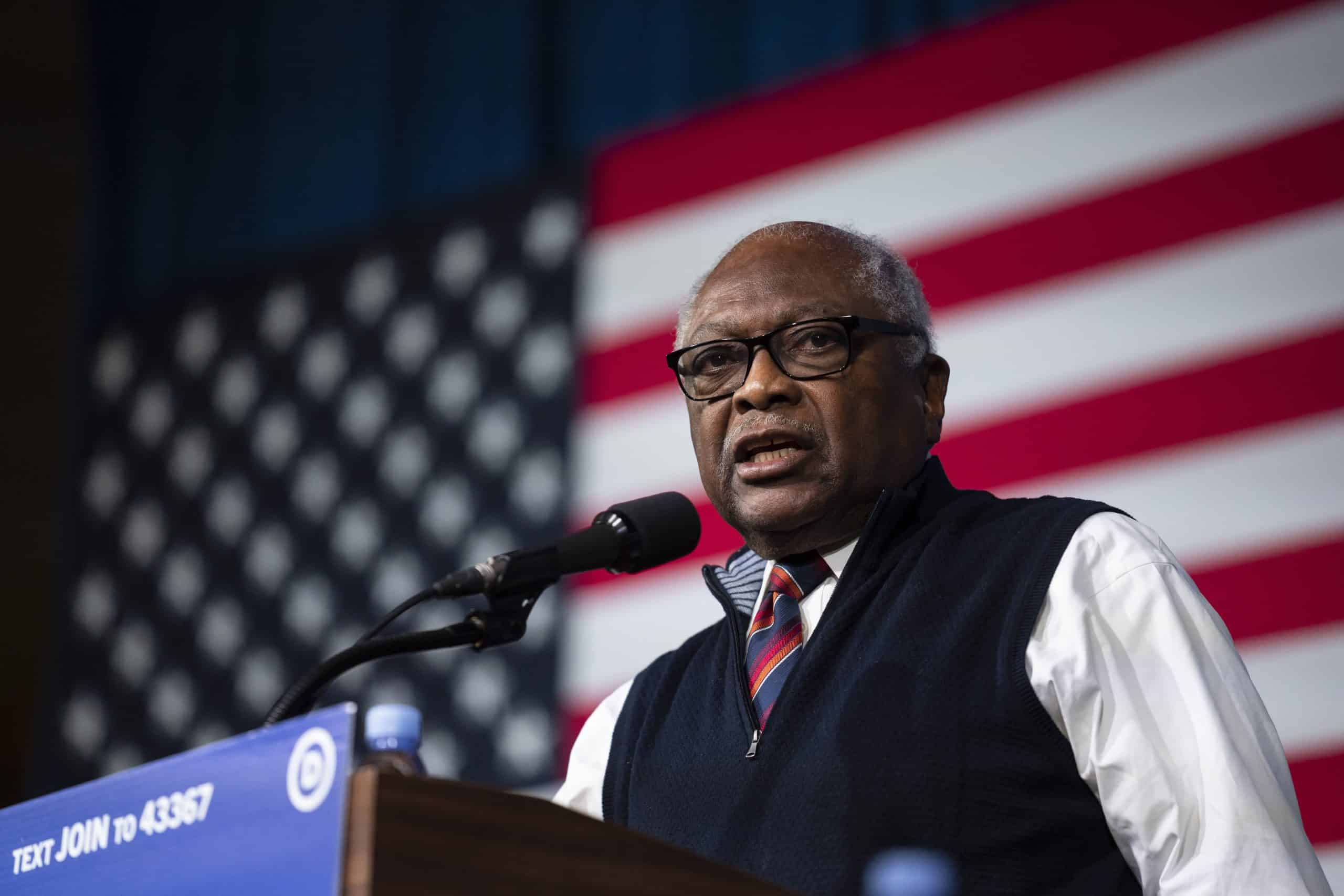Mississippi Today
Top congressional Democrats will visit Jackson to boost voter turnout ahead of state election

U.S. Rep. Jim Clyburn of South Carolina, a top Democrat in Congress, will travel to Jackson this weekend with fellow Democrat U.S. Rep. Bennie Thompson to help energize voter turnout ahead of Mississippi’s November statewide election.
Clyburn, assistant Democratic leader in the House, is expected to meet with Mississippi’s Democratic leaders, visit local churches, interact with college students and dine with statewide Democratic candidates.
“Elections in Mississippi have far-reaching consequences for people all over the state and the country,” Clyburn told Mississippi Today in a statement. “Congressman Thompson and I are proud to stand up and encourage Democrats to do what’s right and head to the polls on Nov. 7.”
The string of visits will culminate in a reception for Clyburn in downtown Jackson on Sunday night, doubling as a celebration of the state party and its candidates.
The South Carolina congressman’s visit comes roughly a month before Mississippians will vote on who should represent them in state offices, with the competitive governor’s race at the top of the ticket.
Brandon Presley, the Democratic nominee for governor, has raised a significant amount of money in his quest to defeat Republican Gov. Tate Reeves’ reelection bid, and public polls have shown the governor could face trouble in capturing an outright majority of the ballots cast on Nov. 7.
Reeves is almost certain to seize on the event as a way to link Presley to national Democrats — a strategy he has relied on throughout the campaign.
But to become the first Democratic candidate to win a governor’s race since 1999, Presley will need an energized base of support to turn out on Election Day, something Clyburn could help deliver.
As north Mississippi’s current utility regulator, Presley has previously worked with Clyburn and Thompson on legislation to expand broadband internet to rural areas and cultivated a relationship with him. But the underlying purpose of the events goes beyond Presley and the November election.
The focus of much of the weekend is to raise funds for the state party infrastructure and strategically finalize plans to mobilize Democratic voters, the foundation of which is Black Mississippians.
And Clyburn is one of the nation’s most prominent Black public officials and has touted the growing influence Deep South states such as Georgia and his home state of South Carolina have on national elections.
Mississippi Democrats have long struggled with successfully organizing and remaining competitive this century, with the Republican Party now holding every statewide office and a supermajority of seats in both chambers of the Legislature.
Two of the primary reasons are a lack of funding and virtually little from national progressive organizations. But that could be changing.
Before Clyburn’s weekend visit, Democratic National Committee Chairman Jaime Harrison surprised south Mississippi Democrats in August when he visited the Gulf Coast, an area of the state typically viewed as a GOP stronghold.
Mississippi Democratic Party Chairman Cheikh Taylor told Mississippi Today that he hopes that a competitive slate of state races mingled with intentional grassroots movement could lead to a new chapter for the progressive party.
“You can’t organize quietly,” Taylor said. “We’re not ducking and dodging and hiding anymore. We’re here to organize in Mississippi.”
This article first appeared on Mississippi Today and is republished here under a Creative Commons license.
Mississippi Today
On this day in 1912

March 9, 1912

Charlotta Bass became one of the nation’s first Black female editor-owners. She renamed The California Owl newspaper The California Eagle, and turned it into a hard-hitting publication. She campaigned against the racist film “Birth of a Nation,” which depicted the Ku Klux Klan as heroes, and against the mistreatment of African Americans in World War I.
After the war ended, she fought racism and segregation in Los Angeles, getting companies to end discriminatory practices. She also denounced political brutality, running front-page stories that read, “Trigger-Happy Cop Freed After Slaying Youth.”
When she reported on a KKK plot against Black leaders, eight Klansmen showed up at her offices. She pulled a pistol out of her desk, and they beat a “hasty retreat,”
The New York Times reported. “Mrs. Bass,” her husband told her, “one of these days you are going to get me killed.” She replied, “Mr. Bass, it will be in a good cause.”
In the 1940s, she began her first foray into politics, running for the Los Angeles City Council. In 1951, she sold the Eagle and co-founded Sojourners for Truth and Justice, a Black women’s group. A year later, she became the first Black woman to run for vice president, running on the Progressive Party ticket. Her campaign slogan: “Win or Lose, We Win by Raising the Issues.”
When Kamala Harris became the first Black female vice presidential candidate for a major political party in 2020, Bass’ pioneering steps were recalled.
“Bass would not win,” The Times wrote. “But she would make history, and for a brief time her lifelong fight for equality would enter the national spotlight.”
This article first appeared on Mississippi Today and is republished here under a Creative Commons license.![]()
Mississippi Today
On this day in 1977
On this day in 1977
March 8, 1977

Henry L. Marsh III became the first Black mayor of the former capital of the Confederacy, Richmond, Virginia.
Growing up in Virginia, he attended a one-room school that had seven grades and one teacher. Afterward, he went to Richmond, where he became vice president of the senior class at Maggie L. Walker High School and president of the student NAACP branch.
When Virginia lawmakers debated whether to adopt “massive resistance,” he testified against that plan and later won a scholarship for Howard University School of Law. He decided to become a lawyer to “help make positive change happen.” After graduating, he helped win thousands of workers their class-actions cases and helped others succeed in fighting segregation cases.
“We were constantly fighting against race prejudice,” he recalled. “For instance, in the case of Franklin v. Giles County, a local official fired all of the black public school teachers. We sued and got the (that) decision overruled.”
In 1966, he was elected to the Richmond City Council and later became the city’s first Black mayor for five years. He inherited a landlocked city that had lost 40% of its retail revenues in three years, comparing it to “taking a wounded man, tying his hands behind his back, planting his feet in concrete and throwing him in the water and saying, ‘OK, let’s see you survive.’”
In the end, he led the city from “acute racial polarization towards a more civil society.” He served as president of the National Black Caucus of Elected Officials and as a member of the board of directors of the National League of Cities.
As an education supporter, he formed the Support Committee for Excellence in the Public Schools. He also hosts the city’s Annual Juneteenth Celebration. The courthouse where he practiced now bears his name and so does an elementary school.
Marsh also worked to bridge the city’s racial divide, creating what is now known as Venture Richmond. He was often quoted as saying, “It doesn’t impress me to say that something has never been done before, because everything that is done for the first time had never been done before.”
He died on Jan. 23, 2025, at the age of 91.
This article first appeared on Mississippi Today and is republished here under a Creative Commons license.![]()
Mississippi Today
Judge tosses evidence tampering against Tim Herrington

A Lafayette County circuit judge ended an attempt to prosecute Sheldon Timothy Herrington Jr., the son of a prominent north Mississippi church family who is accused of killing a fellow University of Mississippi student named Jimmie “Jay” Lee, for evidence tampering.
In a March 7 order, Kelly Luther wrote that Herrington cannot be charged with evidence tampering because of the crime’s two-year statute of limitations. A grand jury indicted the University of Mississippi graduate last month on the charge for allegedly hiding Lee’s remains in a well-known dumping ground about 20 minutes from Herrington’s parent’s house in Grenada.
“The Court finds that prosecution for the charge of Tampering with Physical Evidence commenced outside the two-year statute of limitations and is therefore time-barred,” Luther wrote.
In order to stick, Luther essentially ruled that the prosecution should have brought the charges against Herrington sooner. In court last week, the prosecution argued that it could not have brought those charges to a grand jury without Lee’s remains, which provided the evidence that evidence tampering occurred.
The dismissal came after Herrington’s new counsel, Jackson-area criminal defense attorney Aafram Sellers, filed a motion to throw out the count. Sellers did not respond to a request for commend by press time.
This article first appeared on Mississippi Today and is republished here under a Creative Commons license.![]()
-

 News from the South - Louisiana News Feed4 days ago
News from the South - Louisiana News Feed4 days agoRemarkable Woman 2024: What Dawn Bradley-Fletcher has been up to over the year
-

 News from the South - Oklahoma News Feed1 day ago
News from the South - Oklahoma News Feed1 day agoFeed the Children rolls out new program to help Oklahoma families
-

 News from the South - Oklahoma News Feed3 days ago
News from the South - Oklahoma News Feed3 days agoMarch 6,2025: Rain and snow on the way
-

 News from the South - Virginia News Feed7 days ago
News from the South - Virginia News Feed7 days agoProbation ends in termination for Va. FEMA worker caught in mass layoffs
-

 News from the South - Texas News Feed4 days ago
News from the South - Texas News Feed4 days agoTravis County DA failed to meet deadline to indict murder suspect | FOX 7 Austin
-

 News from the South - North Carolina News Feed6 days ago
News from the South - North Carolina News Feed6 days agoConfederate monument in Edenton will remain in place for now
-

 News from the South - Oklahoma News Feed6 days ago
News from the South - Oklahoma News Feed6 days agoTimeline: Storms bring a risk of tornadoes, damaging winds to Oklahoma (March 3, 2025)
-

 Mississippi Today5 days ago
Mississippi Today5 days agoKey lawmaker reverses course, passes bill to give poor women earlier prenatal care













































